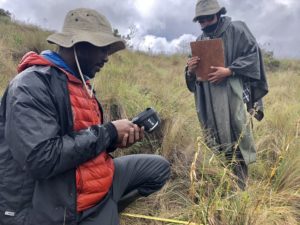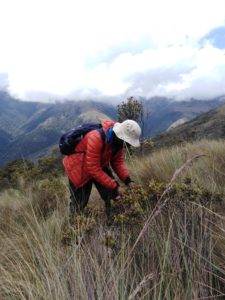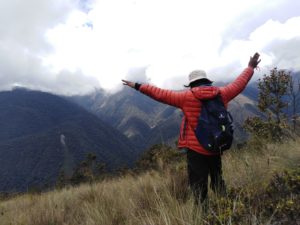It was four days after the end of the pre-course that I packed my bags, ready for the actual in-person Plant functional Trait Course (PFTC) in Peru. I had a lot of expectations – both science and non-science related. In as much as I looked forward to exploring the forest vegetation (especially the cloud forests), grasses and elevational gradient of the Peruvian Andes, I was also in anticipation to see for myself how beautiful the country is. After long hours of flight, the wait was over! I arrived in Peru together with other participants of the course. In reality the country was very nice with beautiful vegetation and landscape! This opportunity was sublime because I had never done science on an elevational gradient. I had experienced cloud forests in the Congo basin, but opportunity had not presented itself for me to work in them prior to the PFTC course. Therefore, my curiosity was heightened right from the onset of the course.
 My overall goal for the course was to learn more about plants and their environment (plant functioning at the plot and community level), acquire data collection, management and analyses skills, sharing knowledge and collaborating with peers/scientist.
My overall goal for the course was to learn more about plants and their environment (plant functioning at the plot and community level), acquire data collection, management and analyses skills, sharing knowledge and collaborating with peers/scientist.
I achieved most of my goals for the course in diverse ways. For instance, my research goal for my group was met. My group focused on leaf-level temperature response of plants to photosynthesis. Our aim was to investigate if plant leaf temperature response is decoupled from air temperature (do thermoregulation occur in leaves?). The data collected from 2 species across three elevational sites revealed leaf temperatures show evidence of thermoregulation. Additionally, I gained relevant skills in measuring temperature response curves using the latest version of LI-COR LI-6800 portable photosynthesis system. Another skillset I developed was in using the FLIR E5 MSX thermal camera which was used to recorded thermal images of our species on the sites. Interacting with the course leaders and other scientists resulted in significantly improving my understanding in most of the studies happening in other groups.
 Covid-19 pandemic affected my ability to fully realize my goals. Unlike other PFTC courses, the PFTC5 was unprecedented in that it was happening at the same time the world was experiencing the covid-19 outbreak. Consequently, we all faced some level of unforeseen circumstances/challenges. Covid-19 cost us some lost time dedicated for fieldwork. As a result, we could not get all the data as planned for the experiment. The pandemic it led to the pre-mature splitting of the course participants which led to about half of the group participating virtually for the last section of the course from their homes in their respective countries. The other half were stuck in Peru due to premature shutdown of international borders to prevent spread of covid-19. One of my goals outside science was to tour and explore more of Peru (E.g. Machu picchu). Covid-19 curtailed these plans so perhaps I will have to come again sometime in the future when there is not disease pandemic.
Covid-19 pandemic affected my ability to fully realize my goals. Unlike other PFTC courses, the PFTC5 was unprecedented in that it was happening at the same time the world was experiencing the covid-19 outbreak. Consequently, we all faced some level of unforeseen circumstances/challenges. Covid-19 cost us some lost time dedicated for fieldwork. As a result, we could not get all the data as planned for the experiment. The pandemic it led to the pre-mature splitting of the course participants which led to about half of the group participating virtually for the last section of the course from their homes in their respective countries. The other half were stuck in Peru due to premature shutdown of international borders to prevent spread of covid-19. One of my goals outside science was to tour and explore more of Peru (E.g. Machu picchu). Covid-19 curtailed these plans so perhaps I will have to come again sometime in the future when there is not disease pandemic.
I gained a lot from the PFTC course in diverse ways. I came into the course with prior field work experience having collected data in Europe, Africa, North and Central America, but the experience I had throughout the program was relevant and immense. Here are a few out of the lot. First, I participated in a social survey research during our first week in Cusco. As an Ecophysiologist, it was a whole new experience since I had never participated in any research that entailed administering questionnaires. I enjoyed the brainstorming session of the questionnaire development. All the questions to be asked at the survey were carefully scrutinized to ensure they met the target audiences’ level of understanding which to me was key. Secondly, I learnt that having gifts accompanying questionnaires facilitates more respondents. I gained more resources from the myriad workshops (example GitHub), not forgetting data processing and management skills. Lots of investments (logistics, people, etc.) goes into data collection therefore data handling from field and lab work must be carefully documented and reproducible. The participants reading list prior to the commencement of the course was of immense benefit. I was able to skim the readings for the other groups outside mine which gave me have a sense of what scientific work others will be conducting. This was further complemented by the pre-course lectures and in-person lectures.
 Peru is by far one of the wonderful places to do science. But besides science it is also an adorable tourist destination. They have excellent food and drinks. Talking of drinks, you cannot leave Peru without a taste of their popular trademark “Pisco sour” drink.
Peru is by far one of the wonderful places to do science. But besides science it is also an adorable tourist destination. They have excellent food and drinks. Talking of drinks, you cannot leave Peru without a taste of their popular trademark “Pisco sour” drink.
The PFTC5 course has contributed immensely to my scientific development and scope of knowledge. It gave me the opportunity to do science whiles at the same time building bridges and collaborations. I am excited to have been a part of the course and to have met all the wonderful participants.